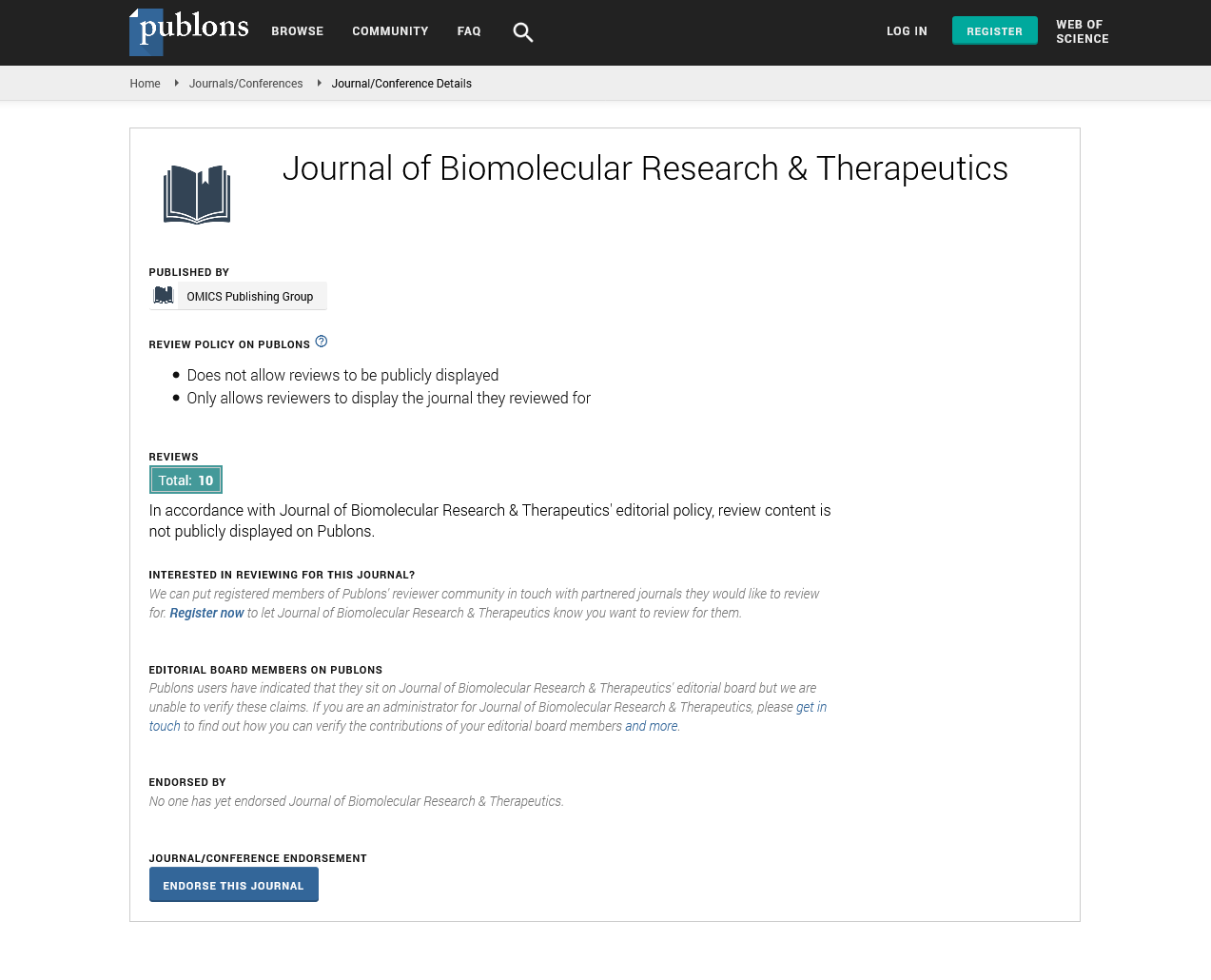Indexed In
- Open J Gate
- Genamics JournalSeek
- ResearchBible
- Electronic Journals Library
- RefSeek
- Hamdard University
- EBSCO A-Z
- OCLC- WorldCat
- SWB online catalog
- Virtual Library of Biology (vifabio)
- Publons
- Euro Pub
- Google Scholar
Useful Links
Share This Page
Journal Flyer

Open Access Journals
- Agri and Aquaculture
- Biochemistry
- Bioinformatics & Systems Biology
- Business & Management
- Chemistry
- Clinical Sciences
- Engineering
- Food & Nutrition
- General Science
- Genetics & Molecular Biology
- Immunology & Microbiology
- Medical Sciences
- Neuroscience & Psychology
- Nursing & Health Care
- Pharmaceutical Sciences
Commentary Article - (2023) Volume 12, Issue 11
The Role of Biomolecular Screening in Molecular Biology Advancements
John Brittany*Received: 04-Oct-2023, Manuscript No. BOM-23-24139; Editor assigned: 06-Oct-2023, Pre QC No. BOM-23-24139(PQ); Reviewed: 23-Oct-2023, QC No. BOM-23-24139; Revised: 30-Oct-2023, Manuscript No. BOM-23-24139(R); Published: 06-Nov-2023, DOI: 10.35248/2167-7956.23.12.347
Description
Molecular biology, the branch of biology that explores the complex mechanisms forms life at the molecular level, has seen record advancements in recent years. One of the key tools driving these advances is biomolecular screening. This powerful technique allows researchers to select through vast libraries of molecules to identify those that interact with biological targets of interest. In this exploration of biomolecular screening, we will delve into its principles, methodologies, applications, and its pivotal role in advancing our understanding of cellular processes and developing new therapeutic interventions.
Principles of biomolecular screening
Biomolecular screening begins with the identification and validation of specific molecular targets associated with a particular biological process or disease. Diverse libraries of molecules, such as small molecules, peptides, or antibodies, are created for screening. These libraries may consist of thousands to millions of compounds. High-Throughput Screening (HTS) This automated method allows the rapid testing of large compound libraries against biological targets. Involves screening smaller, fragment-sized molecules for interactions with a target, providing a foundation for drug design. Computational methods are employed to predict the possibility of a molecule binding to a target, reducing the need for experimental testing.
Methodologies in biomolecular screening
Cell-based assays: Utilizing living cells to assess the biological relevance of interactions.
Biochemical assays: Employing purified biological components to study molecular interactions in isolation.
Fluorescence-based detection: Utilizing fluorescent labels to visualize molecular interactions.
Mass spectrometry: Identifying and quantifying molecules based on their mass and charge.
Surface Plasmon Resonance (SPR): Monitoring changes in refractive index to detect molecular binding events.
Applications of biomolecular screening
Biomolecular screening accelerates the discovery of lead compounds, which can be further optimized for therapeutic development. Understanding the multiple targets of a drug to improve efficacy and reduce side effects. Biomolecular screening is integral in identifying genes and pathways associated with specific cellular functions. Utilizing CRISPR technology to systematically trouble genes and observe phenotypic changes. Biomolecular screening aids in elucidating the specific binding site of a molecule on a target and understanding chance interactions to enhance drug safety.
Advances in biomolecular screening
Machine learning approaches: Utilizing artificial intelligence for data analysis and predicting molecular interactions.
Natural products and diversity: Exploring the vast chemical space, including natural products, to discover novel bioactive compounds.
Fragment-based approaches: Focusing on smaller, more fragment-like molecules for drug discovery.
Multi-omics approaches: Integrating genomics, proteomics, and metabolomics data to gain a comprehensive understanding of cellular processes.
Cryo-Electron Microscopy (Cryo-EM): Visualizing biomolecular structures at near-atomic resolution.
Patient-specific screens: Tailoring biomolecular screening to individual patients for more personalized therapeutic interventions.
Pharmacogenomics: Considering individual genetic variations in drug response prediction.
Biomolecular screening stands as a foundation in the land of molecular biology, driving advancements in drug discovery,functional genomics, and our understanding of cellular processes. As technology continues to evolve, the integration of various approaches and the exploration of chemical space hold capacity for unlocking new dimensions in biomolecular screening. This potent tool not only accelerates the place of scientific discovery but also covers for more targeted and personalized therapeutic interventions, ultimately contributing to the advancement of healthcare and our understanding of time at the molecular level.
Citation: Brittany J (2023) The Role of Biomolecular Screening in Molecular Biology Advancements. J Biol Res Ther. 12:347.
Copyright: © 2023 Brittany J. This is an open access article distributed under the terms of the Creative Commons Attribution License, which permits unrestricted use, distribution, and reproduction in any medium, provided the original author and source are credited.

